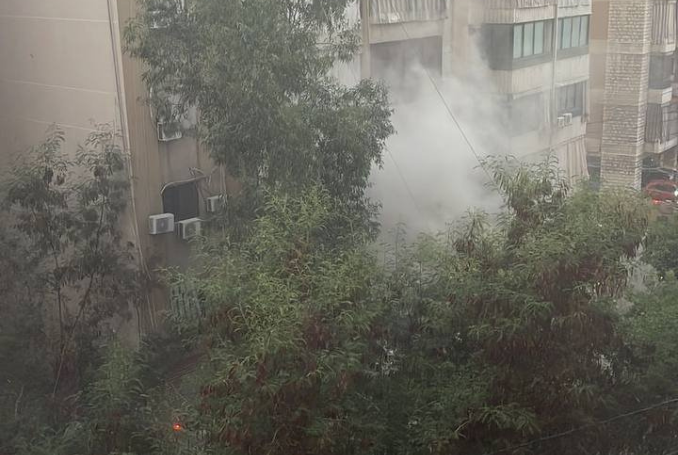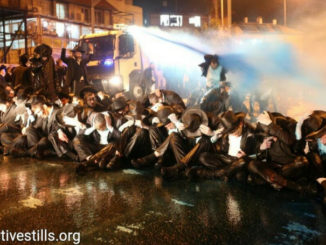
“In response to the Zionist enemy’s claims of assassinating our brother, the fighter Ali Karaki, we confirm that our dear brother, the fighter leader, Hajj Ali Karaki, is fine”. – Hezbollah
The Lebanese movement Hezbollah announced in a statement on Monday evening that its top leader Ali Karaki “enjoys full health and wellness” and denied Israel’s claims that he was killed in an Israeli strike on Beirut earlier on the day.
Israeli media reported on Monday that Karaki, the head of Hezbollah’s southern front and one of the highest-ranking officials in the movement, had been targeted in an Israeli strike in Beirut.
Israeli newspaper Yedioth Ahronoth reported that “a security source confirmed to Reuters that Karaki was the target of the strike but said his fate remains unknown.”
Citing a Lebanese source, Sky News Arabia reported that Karaki had been killed.
Hezbollah, however, denied Israeli claims.
? BREAKING
HEZBOLLAH: In response to the zionist enemy's claims of assassinating our brother, the fighter Ali Karaki, we confirm that our dear brother, the fighter leader, Hajj Ali Karaki, is fine and, God willing, in full health and wellness and has moved to a safe place. pic.twitter.com/k5HKFjKbQU
— The Palestine Chronicle (@PalestineChron) September 23, 2024
“In response to the Zionist enemy’s claims of assassinating our brother, the fighter Ali Karaki, we confirm that our dear brother, the fighter leader, Hajj Ali Karaki, is fine and, God willing, in full health and wellness,” Hezbollah said in its statement, adding that he “has moved to a safe place”.
Continuous Israeli strikes since Monday morning killed at least 356 Lebanese and wounded 1,246 more, according to the Lebanese Health Ministry.
‘Preemptive Strikes’
The Israeli military carried out hundreds of airstrikes on southern and eastern Lebanon, which its spokesperson described as a “preemptive strike” aimed at neutralizing Hezbollah movements targeting Israel.
The raids targeted towns including Mays al-Jabal, Aitaroun, Houla, Taybeh, Markaba, Bani Hayyan, Jabal al-Rayhan, the heights of Iqlim al-Tuffah, Bint Jbeil, Hanin, Zawtar, and the Nabatieh region in southern Lebanon.
In the east, the attacks hit the areas surrounding Shaara, Harbata, Hermel, and the towns of Shamstar, Taraya, and Boday. The town of Al-Khader in the Baalbek region and the surroundings of the town of Nabi Sheet were also bombed.
❌LEBANESE HEALTH MINISTRY: 356 people have been killed and 1,246 others have been injured, including women, children, and paramedics, as a result of Israeli raids on southern and eastern Lebanon since Monday morning. pic.twitter.com/l0nm1G3WAN
— The Palestine Chronicle (@PalestineChron) September 23, 2024
Long-Range Missiles
In retaliation, Hezbollah launched waves of missile attacks targeting a wide area from the Golan to Haifa and Marj Ibn Amer, also involving long-range missiles for the first time since the start of the war on October 8.
Sirens sounded in towns across greater Tel Aviv and near Ben Gurion Airport, with reports of rockets falling in locations in the West Bank.
Yedioth Ahronoth reported that around 165 rockets have been fired from Lebanon into Israel since the morning. Explosions were heard in the city of Haifa, and sirens were activated in the southern parts of the city, as well as in Acre, Carmel, and the central Galilee, following a large barrage of rockets from Lebanon.
? For the first time since 2006, rockets targeted wide swaths of the center of Haifa and its surroundings. Over 300,000 settlers have entered shelters. pic.twitter.com/1xa9ERejjS
— The Palestine Chronicle (@PalestineChron) September 23, 2024
‘Complicated Days’
Israeli Prime Minister Benjamin Netanyahu, speaking from the Defense Ministry’s main command room in Tel Aviv, warned that Israel was “on the cusp of complicated days.”
He affirmed that Israel is working to change the balance of power in the north, emphasizing that the country £does not wait for the threat, but rather anticipates it, according to Channel 12.
Meanwhile, the Israeli news website Walla website cited senior Israeli army commanders as saying they are “ready to launch a ground operation in Lebanon.”
However, Bloomberg quoted an Israeli military official stating that the current focus remains on the air campaign, and a ground invasion is not imminent.
(PC, AJA)










I think we can safely say that the IDF is not in top fighting condition any more. Hence the insistence that “the current focus remains on the air campaign, and a ground invasion is not imminent.”